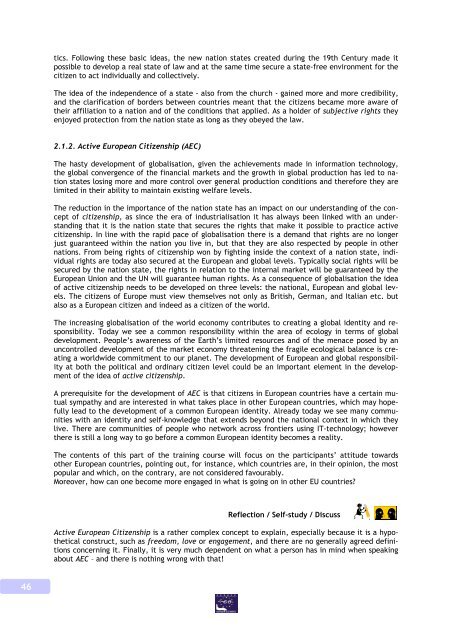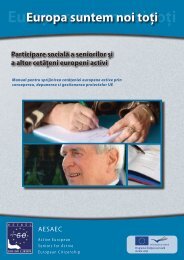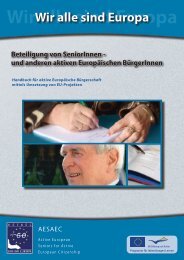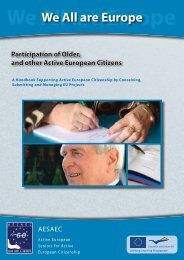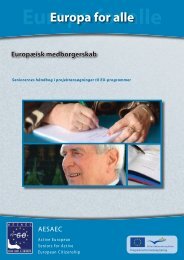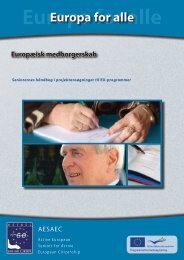We All are Europe - AESAEC
We All are Europe - AESAEC
We All are Europe - AESAEC
You also want an ePaper? Increase the reach of your titles
YUMPU automatically turns print PDFs into web optimized ePapers that Google loves.
tics. Following these basic ideas, the new nation states created during the 19th Century made it<br />
possible to develop a real state of law and at the same time secure a state-free environment for the<br />
citizen to act individually and collectively.<br />
The idea of the independence of a state - also from the church - gained more and more credibility,<br />
and the clarification of borders between countries meant that the citizens became more aw<strong>are</strong> of<br />
their affiliation to a nation and of the conditions that applied. As a holder of subjective rights they<br />
enjoyed protection from the nation state as long as they obeyed the law.<br />
2.1.2. Active <strong>Europe</strong>an Citizenship (AEC)<br />
The hasty development of globalisation, given the achievements made in information technology,<br />
the global convergence of the financial markets and the growth in global production has led to nation<br />
states losing more and more control over general production conditions and therefore they <strong>are</strong><br />
limited in their ability to maintain existing welf<strong>are</strong> levels.<br />
The reduction in the importance of the nation state has an impact on our understanding of the concept<br />
of citizenship, as since the era of industrialisation it has always been linked with an understanding<br />
that it is the nation state that secures the rights that make it possible to practice active<br />
citizenship. In line with the rapid pace of globalisation there is a demand that rights <strong>are</strong> no longer<br />
just guaranteed within the nation you live in, but that they <strong>are</strong> also respected by people in other<br />
nations. From being rights of citizenship won by fighting inside the context of a nation state, individual<br />
rights <strong>are</strong> today also secured at the <strong>Europe</strong>an and global levels. Typically social rights will be<br />
secured by the nation state, the rights in relation to the internal market will be guaranteed by the<br />
<strong>Europe</strong>an Union and the UN will guarantee human rights. As a consequence of globalisation the idea<br />
of active citizenship needs to be developed on three levels: the national, <strong>Europe</strong>an and global levels.<br />
The citizens of <strong>Europe</strong> must view themselves not only as British, German, and Italian etc. but<br />
also as a <strong>Europe</strong>an citizen and indeed as a citizen of the world.<br />
The increasing globalisation of the world economy contributes to creating a global identity and responsibility.<br />
Today we see a common responsibility within the <strong>are</strong>a of ecology in terms of global<br />
development. People’s aw<strong>are</strong>ness of the Earth’s limited resources and of the menace posed by an<br />
uncontrolled development of the market economy threatening the fragile ecological balance is creating<br />
a worldwide commitment to our planet. The development of <strong>Europe</strong>an and global responsibility<br />
at both the political and ordinary citizen level could be an important element in the development<br />
of the idea of active citizenship.<br />
A prerequisite for the development of AEC is that citizens in <strong>Europe</strong>an countries have a certain mutual<br />
sympathy and <strong>are</strong> interested in what takes place in other <strong>Europe</strong>an countries, which may hopefully<br />
lead to the development of a common <strong>Europe</strong>an identity. Already today we see many communities<br />
with an identity and self-knowledge that extends beyond the national context in which they<br />
live. There <strong>are</strong> communities of people who network across frontiers using IT-technology; however<br />
there is still a long way to go before a common <strong>Europe</strong>an identity becomes a reality.<br />
The contents of this part of the training course will focus on the participants’ attitude towards<br />
other <strong>Europe</strong>an countries, pointing out, for instance, which countries <strong>are</strong>, in their opinion, the most<br />
popular and which, on the contrary, <strong>are</strong> not considered favourably.<br />
Moreover, how can one become more engaged in what is going on in other EU countries<br />
Reflection / Self-study / Discuss<br />
Active <strong>Europe</strong>an Citizenship is a rather complex concept to explain, especially because it is a hypothetical<br />
construct, such as freedom, love or engagement, and there <strong>are</strong> no generally agreed definitions<br />
concerning it. Finally, it is very much dependent on what a person has in mind when speaking<br />
about AEC – and there is nothing wrong with that!<br />
46


